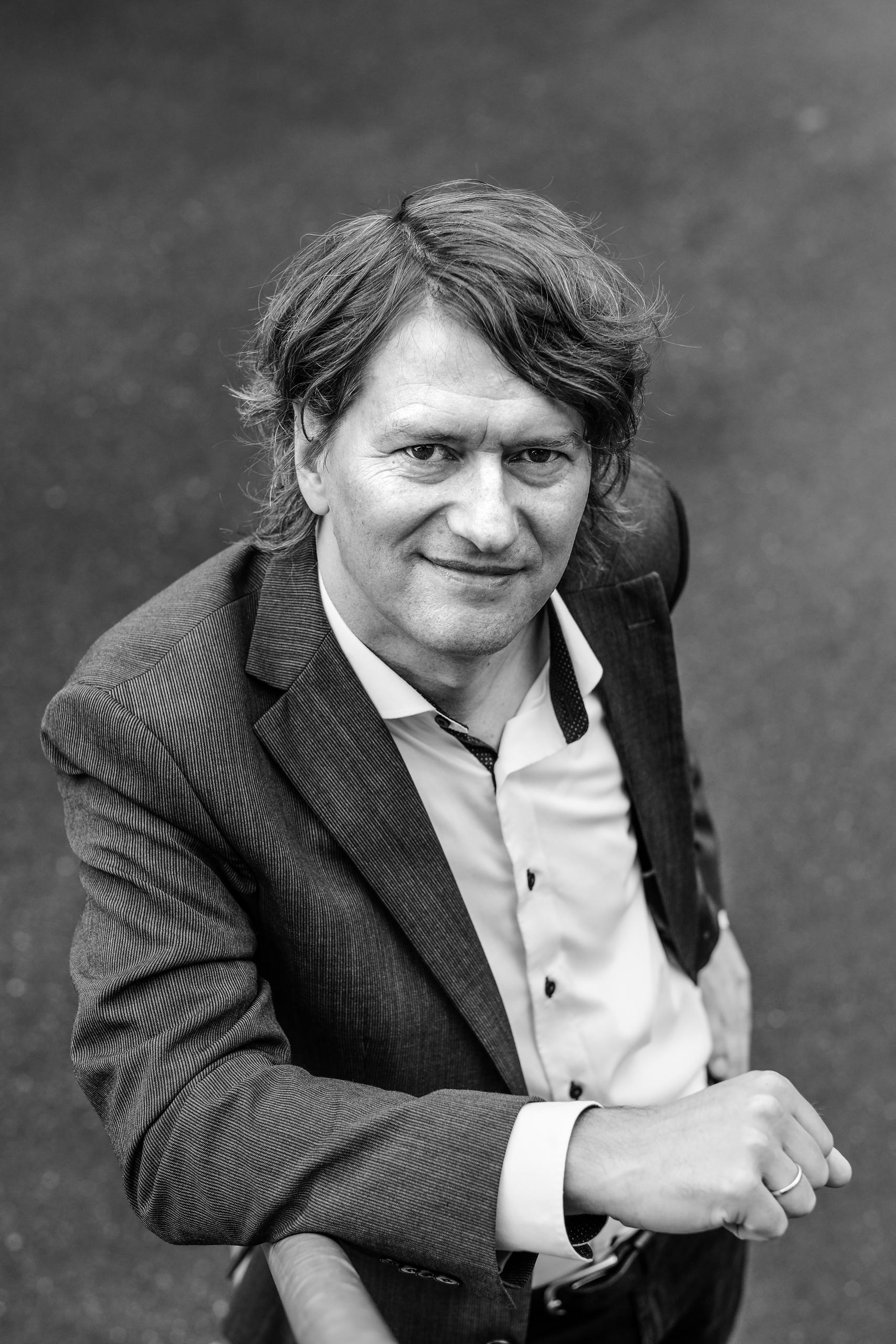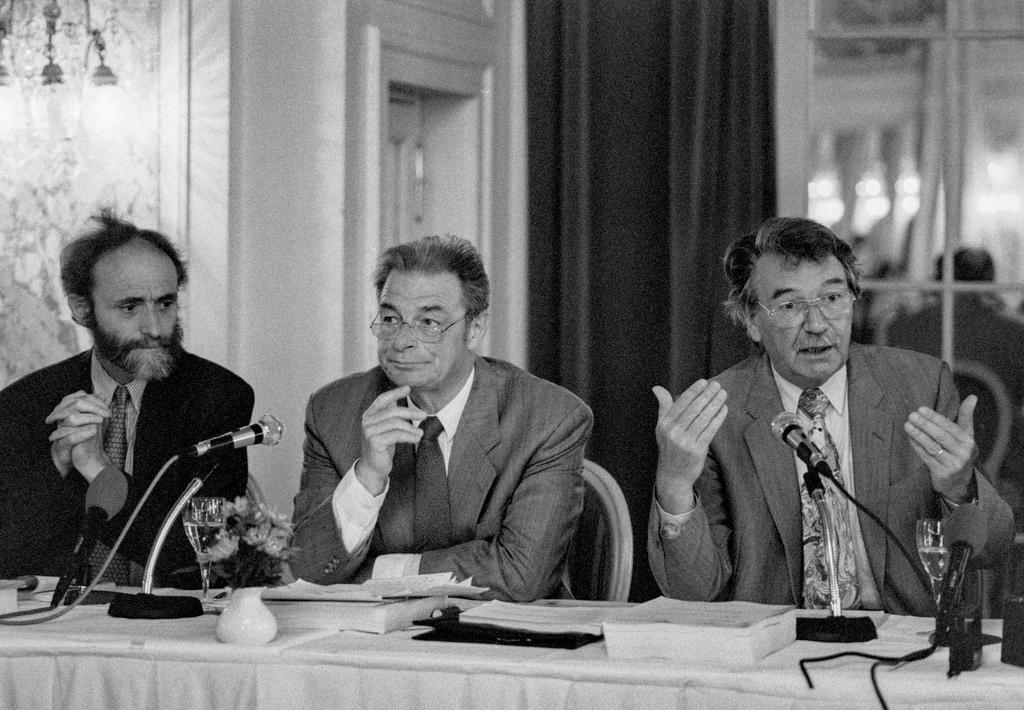
Swiss-EU relations are at a ‘dead end’

German journalist Steffen Klatt takes a sober look at the state of relations between Brussels and Bern in his new book “Blind im Wandel. Ein Nationalstaat in der Sackgasse” (“Blind to change. A nation state at a dead end.”)
swissinfo.ch: Since 2014, Bern and Brussels have been in talks to formalise relations, now covered by around 100 separate accords. Do we really need the so-called institutional framework agreement under discussion?
Steffen Klatt: Switzerland has reached a dead end, whether the framework agreement is successful or not. Switzerland doesn’t want to belong to the EU, but it wants to take part in the European single market. It has to abide by the rules that apply, but it has no voice in shaping these rules. This problem is now 30 years old.
In 1989, when European Commission President Jacques Delors proposed establishing a European Economic Area (EEA), he conceded that EEA countries could also participate in shaping the rules. Switzerland went into the negotiations wanting to make a deal that would give it a decision-making role. It didn’t get one. Since then, the EU has changed a great deal. But Switzerland’s position remains the same.

swissinfo.ch: 1992 marked a turning-point. The “no” vote to the EEA introduced a new bilateral path. In 2014, there was a successful initiative to curb immigration from the EU. Your book was published in 2018. Why now?
S.K.: The mass immigration initiative exposed a basic problem in Swiss democracy. On February 9, 2014, the people said they no longer wanted the bilateral treaties they had previously said “yes” to five times. It was a completely new dimension.
The government and parliament translated these five decisions made by the electorate faithfully into law. They are cemented in an array of laws and regulations. But suddenly, the people changed their minds. If this has been taken literally, the consequence would have been to break bilateral treaties. Of course, in the end, parliament found a solution based on legal tricks. But the fundamental problem remains.
In addition to mass immigration, there is an array of long-term European issues which lead to a real or apparent crisis every couple of months. The latest example is the eight-day rule [Swiss law that requires foreign companies to give eight days’ notice of their intention to operate in Switzerland. This gives the Swiss authorities sufficient time to check whether domestic wage protection measures are being observed], but there is also the demise of banking secrecy and the strength of the Swiss franc. This accumulation of dysfunctional elements in Swiss business and politics is very apparent. Someone had to write about it.
swissinfo.ch: This contradiction is very visible in the mass immigration initiative. Its implementation has been very different from the original text of the referendum initiative.
S.K.: What this shows is that the people are no longer sovereign and that direct democracy doesn’t deliver what it promises, that is, citizens’ participation in decision-making. Citizens no longer have a significant decision-making role via direct democracy. We are actually in a representative democracy, where parties can block each other, where they can once again exact revenge via the electorate if they haven’t succeeded in parliament.
swissinfo.ch: This might be true in practice, but direct democracy is anchored in civic rights, which are binding. No one in Switzerland would meddle with these.
S.K.: These civic rights originated at a time when the nation state alone determined the few rules that had to be set. Today, the rules come from Brussels. So we need to adapt direct democracy to this, and say that we, the people, want to make fundamental decisions. How these should be spelled out in law is something we can then confidently leave to lawmakers and administrators.
As an example, the referendum on the pension system was so complex that parties on the left were unable to decide if they should vote for or against it. The fundamental questions, however, were not up for debate. Do we want to work longer? Do we want to pay higher taxes? Or do we want to have lower pensions when we retire? If the pension system must be revised every five years but then everything fails because of small details, then this is just political inefficiency.
swissinfo.ch: You talk about a democracy where citizens provide the impetus and direction at the centre of the political process. What exactly do you mean?
S.K.: Today we can either get involved at the beginning, with an initiative, or at the end, with a referendum. But in the middle, where the important decisions are made, we have no right to take part in the debate. As long as we believe in our right to a voice, that is alright. But as soon as we no longer believe in it – and a majority of [conservative right] Swiss People’s Party (SVP) voters, for example, no longer believes in it – then we have a problem.
swissinfo.ch: This is symptomatic of a bigger problem. You call it the decline of “Swiss capitalism”. What do you mean by that?
S.K.: One of the special things about the Swiss federal state is that it was founded during the birth of capitalism, just as the industrial society was taking shape here in Switzerland. In principle, the early state was a large coalition of tradespeople – these were the Democrats – and industry chiefs like Alfred Escher.
The basic compromise worked as follows. In simple terms, the industrial chiefs took charge of the federal state and regulated trade relations with foreign countries. The tradespeople and small businessmen determined what happened in the cantons. The Swiss federal state was, in principle, always a political committee made up of big Swiss businesses, a more effective economiesuisse [Swiss Business Federation].
This arrangement also explains why wealth is so well distributed in Switzerland, why we all have relatively high wages. The distribution doesn’t take place at the end of the chain in Switzerland; instead, all parts of society are involved in generating prosperity. This Swiss-style “New Deal” has worked for as long as Switzerland could dictate its own rules. The minute it could no longer do so, the system collapsed.

swissinfo.ch: Talking about the right to share in decision-making reminds me of Roger Köppel, the publisher of the weekly Weltwoche magazine and SVP parliamentarian. He says that anyone who believes that Swiss sovereignty would be strengthened by having a say in the EU is mistaken, as only the Swiss central government would be strengthened. What do you think?
S.K.: On a basic level, he is right – many governments have been able to consolidate their power via Brussels. But a year and a half ago, the Belgian region of Wallonia was able to block ratification of the EU trade agreement with Canada. Why? Because Belgian law stipulates that all regions had to ratify the agreement.
The Danish government must also consult its parliamentary Europe committee before committing to anything. The EU has had a lot of experience with the people’s veto. It would not, however, allow a new member to block any European agreement. But it would accept a national implementation that leaves room for compliance with civic rights.
swissinfo.ch: And yet there is much more democracy in Switzerland than in the EU.
S.K.: The European Parliament used to be a farce. But today it is a normal, democratic assembly, with fewer powers than the German Bundestag, but more than the French National Assembly. And the process of democratisation in the EU is not yet complete.
swissinfo.ch: Could Switzerland agree to submit to European Court of Justice rulings, and in turn receive a seat on the EU Council of Ministers?
S.K.: Switzerland could also submit to the European Free Trade Association (EFTA) court, which was until recently presided over by Carl Baudenbacher, who is Swiss, and the court is in any case a Swiss invention. With one or two Swiss people on the council, this would be the ideal court.
swissinfo.ch: Why does no one talk about this solution anymore?
S.K.: I think none of the parties believe this will reap huge rewards a year before the elections. If Switzerland doesn’t demand this, then who will? Britain will be wrapped up with itself for years, Norway has come to terms with the situation and has less direct democracy than Switzerland. We are much better placed to demand this.

In compliance with the JTI standards
More: SWI swissinfo.ch certified by the Journalism Trust Initiative
















![The four-metre-long painting "Sonntag der Bergbauern" [Sunday of the Mountain Farmers, 1923-24/26] had to be removed by a crane from the German Chancellery in Berlin for the exhibition in Bern.](https://www.swissinfo.ch/content/wp-content/uploads/sites/13/2025/12/01_Pressebild_KirchnerxKirchner.jpg?ver=cb688ed5)














You can find an overview of ongoing debates with our journalists here . Please join us!
If you want to start a conversation about a topic raised in this article or want to report factual errors, email us at english@swissinfo.ch.